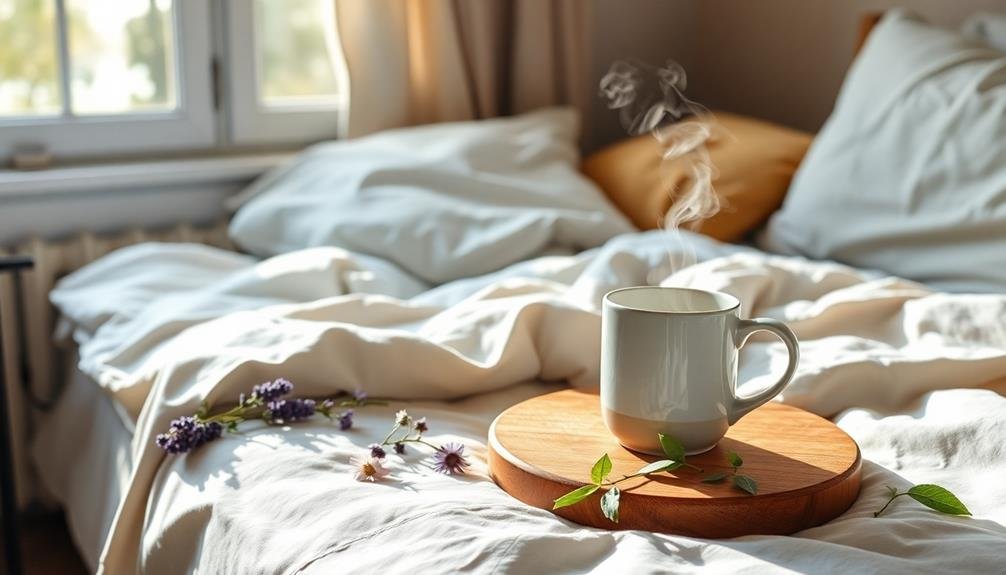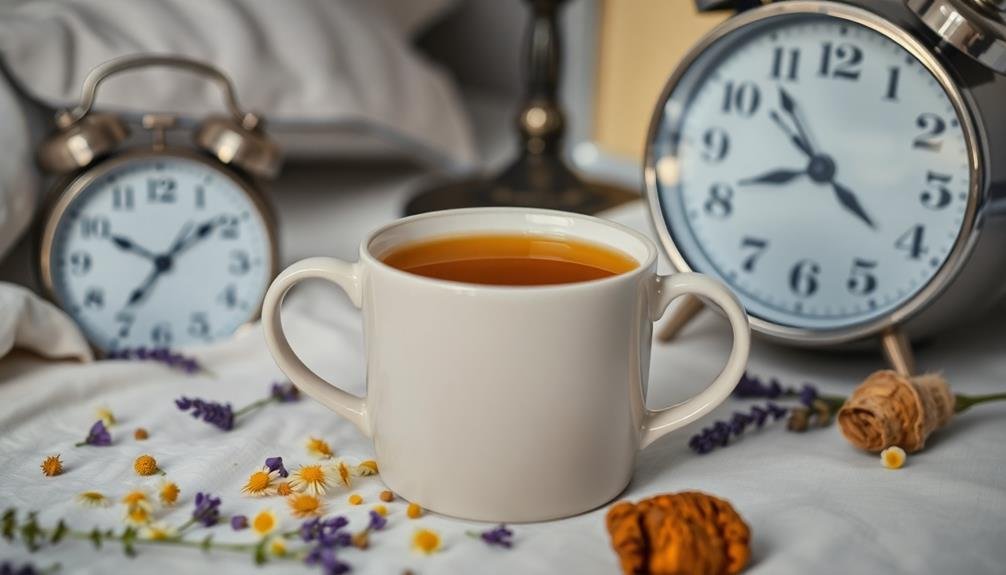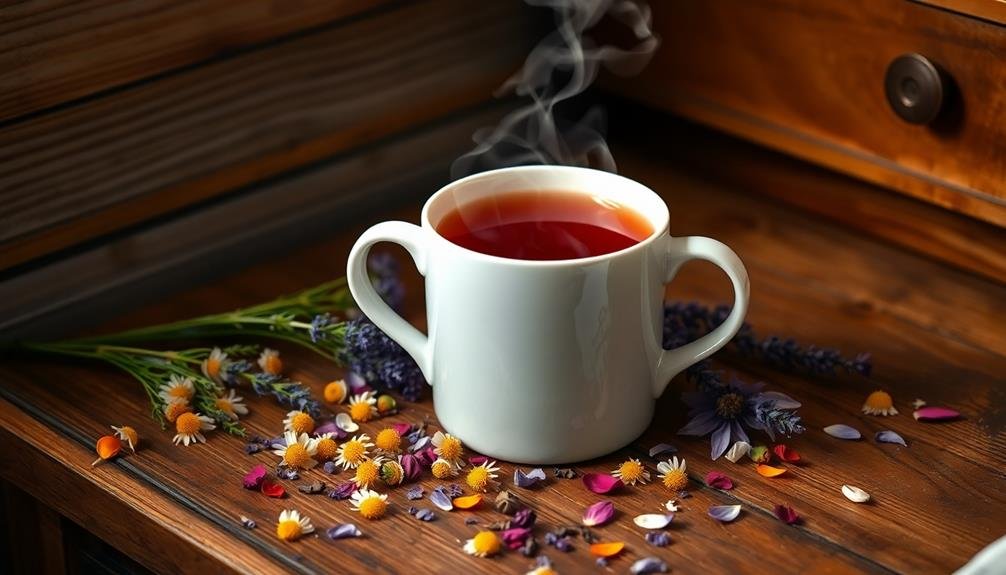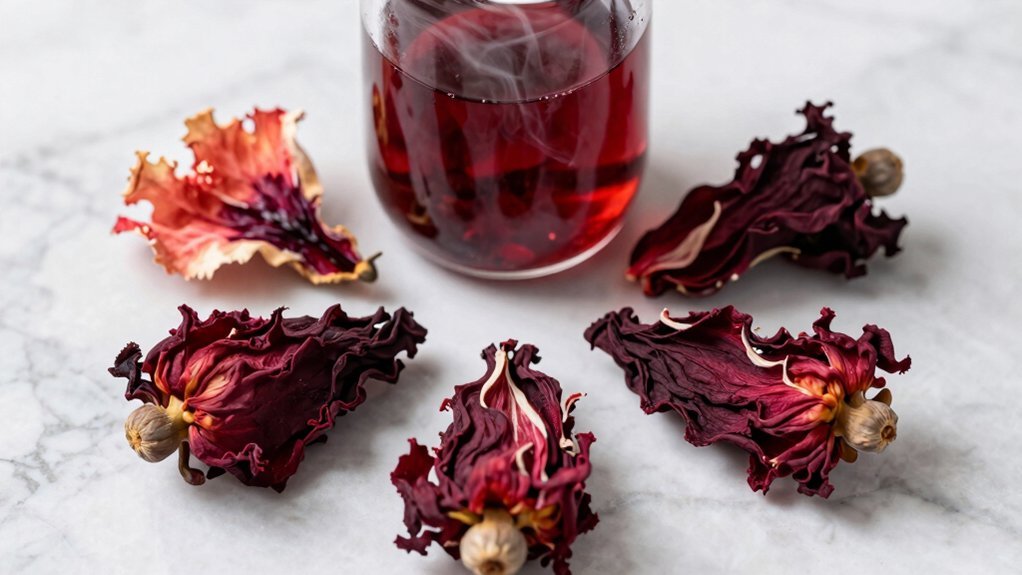Create your own anxiety-busting bedtime tea blend for better sleep tonight. Combine calming herbs like chamomile, lavender, lemon balm, and passionflower to promote relaxation and ease anxiety. These herbs work synergistically to reduce stress, improve sleep quality, and calm your nervous system. Use organic ingredients when possible, and store your blend in an airtight container away from light and heat. Brew your tea using fresh, filtered water and steep for 5-10 minutes to maximize benefits. Enhance your bedtime ritual by sipping this soothing blend in a calm environment. Discover how this simple DIY solution can transform your nightly routine and overall well-being.
Benefits of Herbal Sleep Teas

Herbal sleep teas can help you wind down and prepare for a restful night. These natural blends offer a caffeine-free alternative to traditional teas, promoting relaxation and easing you into sleep. Many herbs used in sleep teas have been shown to reduce anxiety, calm the nervous system, and improve sleep quality.
Chamomile, a common ingredient in sleep teas, contains apigenin, an antioxidant that binds to specific receptors in your brain, potentially reducing insomnia. Valerian root is another popular choice, known for its sedative properties that can shorten the time it takes to fall asleep.
Lavender, often included for its soothing aroma, has been linked to improved sleep efficiency and reduced anxiety. Passionflower is believed to increase GABA levels in the brain, promoting relaxation and reducing stress.
Lemon balm, another frequent addition, has mild sedative effects and may help alleviate restlessness. These herbs, when combined, can create a powerful synergy that addresses various aspects of sleep difficulties.
Essential Herbs for Anxiety Relief
When crafting your personalized bedtime tea blend, you'll want to include herbs known for their anxiety-relieving properties.
Chamomile stands out for its calming effects, helping to soothe both mind and body.
Lavender and lemon balm are equally valuable additions, with lavender promoting relaxation and lemon balm reducing stress and promoting better sleep quality.
Calming Chamomile Benefits
Chamomile, a gentle yet potent herb, stands out as a cornerstone in anxiety-relieving tea blends. Its calming properties have been celebrated for centuries, making it a go-to choice for those seeking natural relaxation.
When you brew a cup of chamomile tea, you're tapping into a wealth of benefits that can help ease your mind and prepare your body for restful sleep.
The power of chamomile lies in its compounds, particularly apigenin, which binds to specific receptors in your brain. This interaction promotes relaxation and can greatly reduce feelings of anxiety.
You'll find that regular consumption of chamomile tea may:
- Improve sleep quality and reduce insomnia
- Decrease stress and tension headaches
- Alleviate digestive discomfort often associated with anxiety
Soothing Lavender Properties
While chamomile offers a gentle embrace, lavender brings its own unique calm to the table. This fragrant herb has been used for centuries to promote relaxation and improve sleep quality. Lavender's soothing properties stem from its high concentration of linalool, a compound known for its anxiety-reducing effects.
When you incorporate lavender into your bedtime tea blend, you're tapping into its ability to lower heart rate and blood pressure, helping your body shift into a state of rest. It's also been shown to increase slow-wave sleep, the deep, restorative phase that leaves you feeling refreshed in the morning.
Lavender's benefits extend beyond sleep improvement. It can help alleviate headaches, reduce muscle tension, and even boost your mood. If you're prone to racing thoughts at bedtime, lavender's mild sedative effect may help quiet your mind.
To harness lavender's full potential, use dried buds rather than essential oil in your tea blend. Steep for 5-7 minutes to extract its calming compounds. Remember, a little goes a long way – too much can result in a bitter taste.
Stress-Reducing Lemon Balm
Lemon balm's citrusy aroma and delicate flavor make it a perfect addition to your bedtime tea blend. This herb has been used for centuries to promote relaxation and reduce stress. When you incorporate lemon balm into your nightly routine, you'll benefit from its calming properties that can help ease anxiety and improve sleep quality.
Studies have shown that lemon balm can notably decrease anxiety symptoms and promote a sense of calmness. It works by increasing levels of GABA, a neurotransmitter that helps regulate mood and reduce stress.
Adding lemon balm to your tea blend can:
- Alleviate nervous tension and restlessness
- Improve sleep onset and duration
- Enhance cognitive function and mental clarity
To use lemon balm in your DIY tea blend, simply add 1-2 teaspoons of dried leaves to your mixture. You can also steep fresh leaves for a more potent flavor.
For best results, combine lemon balm with other calming herbs like chamomile or passionflower. Remember to steep your tea for at least 5-10 minutes to extract the full benefits of this stress-reducing herb.
Choosing Quality Ingredients

When selecting herbs for your bedtime tea blend, you'll need to decide between organic and conventional options.
Your choice can impact both the flavor and potential health benefits of your tea.
Remember that the freshness of your herbs and proper storage techniques are essential for maintaining their potency and taste over time.
Organic vs. Conventional Herbs
Two key considerations when selecting herbs for your DIY bedtime tea blend are organic and conventional options.
Organic herbs are grown without synthetic pesticides or fertilizers, potentially offering a purer product with fewer chemical residues. They're often considered more environmentally friendly and may have higher concentrations of beneficial compounds. However, organic herbs can be more expensive and may have a shorter shelf life.
Conventional herbs, on the other hand, are typically more affordable and widely available. They're grown using standard agricultural practices, which may include the use of synthetic pesticides and fertilizers. While these herbs can still be of high quality, they might contain trace amounts of chemical residues.
When deciding between organic and conventional herbs, consider:
- Your budget and how frequently you'll use the herbs
- Your personal health concerns and sensitivity to potential chemical residues
- The specific herb's likelihood of retaining pesticides (some herbs are more prone than others)
Ultimately, the choice between organic and conventional herbs depends on your priorities and circumstances.
Whichever you choose, focus on selecting fresh, high-quality herbs from reputable sources to guarantee the best results for your DIY bedtime tea blend.
Freshness and Storage Matters
Selecting fresh, high-quality ingredients is vital for creating an effective DIY bedtime tea blend. When shopping for herbs, look for vibrant colors, strong aromas, and crisp textures. Avoid herbs that appear faded, dusty, or have a musty smell, as these may have lost their potency.
Once you've acquired your herbs, proper storage is important to maintain their freshness and medicinal properties. Store your herbs in airtight containers, away from direct sunlight, heat, and moisture. Glass jars or metal tins work well for this purpose.
Label each container with the herb's name and purchase date to keep track of freshness.
For peak potency, use your herbs within six months to a year. Some herbs, like chamomile and lavender, may retain their properties for up to two years when stored correctly. However, it's best to replenish your stock regularly to guarantee maximum effectiveness.
When preparing your bedtime tea blend, crush or grind the herbs just before use to release their essential oils and active compounds. This will make sure you're getting the most benefit from your carefully selected ingredients, helping you achieve a restful night's sleep.
DIY Tea Blend Recipe
Crafting your own bedtime tea blend is simpler than you might think. With a few key ingredients, you can create a soothing and effective sleep aid tailored to your tastes. Start with a base of chamomile, known for its calming properties. Add valerian root for its sedative effects, and include lavender for its relaxing aroma and flavor. Experiment with proportions to find your perfect balance.
To enhance your blend, consider these additional ingredients:
- Passionflower to reduce anxiety and promote better sleep quality
- Lemon balm to ease stress and improve mood
- Hops for their mild sedative properties
Measure out 1 teaspoon of your custom blend per cup of hot water. Steep for 5-7 minutes, or longer for a stronger flavor. Strain and enjoy about 30 minutes before bedtime.
For best results, use loose leaf herbs rather than tea bags, as they offer more potent flavors and benefits. Store your blend in an airtight container away from light and heat to maintain freshness.
With regular use, you'll likely notice improved sleep quality and reduced anxiety over time.
Proper Brewing Techniques

Now that you've created your perfect bedtime tea blend, it's time to focus on brewing it correctly. Start by heating fresh, filtered water to just below boiling point (around 200°F or 93°C). This temperature helps extract the best flavors and benefits from your herbs without scorching them.
For a single cup, use about 1-2 teaspoons of your DIY blend. Place the herbs in a tea infuser or reusable tea bag. If you're using loose herbs, you'll need to strain them later.
Pour the hot water over your herbs and cover the cup with a small plate or lid. This traps the steam and essential oils, ensuring a more flavorful and potent brew.
Let your tea steep for 5-10 minutes, depending on your desired strength. Avoid over-steeping, as it can lead to a bitter taste. Remove the infuser or strain the loose herbs.
If you prefer a sweeter tea, add a small amount of honey or stevia after brewing. Sip your tea slowly, ideally 30-60 minutes before bedtime, to allow its calming effects to take hold gradually.
Enhancing Your Bedtime Ritual
Creating a soothing bedtime ritual goes beyond just brewing your DIY tea blend. To maximize the calming effects of your tea and prepare your mind and body for sleep, consider incorporating other relaxation techniques into your nightly routine.
Start by setting the mood in your bedroom. Dim the lights or use soft, warm lighting to signal to your body that it's time to wind down. Remove electronic devices or set them to night mode to reduce blue light exposure.
You might also want to try:
- Gentle stretching or yoga to release physical tension
- Meditation or deep breathing exercises to quiet your mind
- Journaling to process your thoughts and worries
As you sip your tea, engage your senses fully. Notice the warmth of the cup in your hands, inhale the soothing aroma, and savor each sip mindfully.
This practice can help anchor you in the present moment and ease anxiety.
Potential Side Effects

While herbal teas are generally safe, they can occasionally cause side effects or interact with medications. Be aware of potential allergic reactions to any of the ingredients in your bedtime tea blend. Chamomile, for instance, may cause allergic reactions in people sensitive to ragweed or other plants in the daisy family.
Valerian root can cause headaches, dizziness, or stomach upset in some individuals. It may also interact with certain medications, including sedatives and antidepressants.
Lavender might increase drowsiness when combined with sleep aids or other sedating herbs.
If you're pregnant or breastfeeding, consult your healthcare provider before consuming herbal teas, as some ingredients may not be safe. Those with liver or kidney issues should be cautious with certain herbs, as they may affect organ function.
Be mindful of the caffeine content in any tea you include. Even small amounts of caffeine can disrupt sleep for sensitive individuals.
If you experience any unusual symptoms after drinking your bedtime tea blend, discontinue use and consult a healthcare professional. Always start with small amounts to gauge your body's reaction to new herbal combinations.
Storage and Shelf Life
To get the most out of your DIY bedtime tea blend, proper storage is key. Keep your herbal mixture in an airtight container, away from direct sunlight and heat sources. A cool, dark pantry or cupboard is ideal. Glass jars or tins work well, but make certain they're completely dry before filling to prevent mold growth.
When stored correctly, your homemade tea blend can last up to six months. However, for the best flavor and potency, it's recommended to use it within three months. Over time, the herbs may lose their aroma and therapeutic properties. To check if your blend is still good, give it a sniff – if it smells musty or off, it's time to make a fresh batch.
Here are some tips to extend your tea blend's shelf life:
- Label your container with the date you made the blend
- Store different herbs separately and mix only when brewing
- Use a clean, dry spoon when scooping out the tea to avoid introducing moisture
Frequently Asked Questions
Can Pregnant Women Safely Consume This Anxiety-Busting Bedtime Tea Blend?
You should consult your healthcare provider before consuming any anxiety-busting bedtime tea blend during pregnancy. Some herbal ingredients may not be safe for expectant mothers. It's best to err on the side of caution and get professional advice.
How Long Does It Take for the Tea to Start Working?
You'll typically feel the calming effects within 15-30 minutes after drinking the tea. However, everyone's different, so it might take up to an hour for you to notice its full impact on your anxiety and sleep.
Can Children Drink This Tea Blend for Better Sleep?
You shouldn't give this tea blend to children without consulting a pediatrician first. While some herbs are safe, others may not be suitable for kids. It's best to explore child-specific sleep remedies recommended by healthcare professionals.
Is It Safe to Combine This Tea With Prescription Sleep Medications?
You shouldn't combine herbal teas with prescription sleep medications without consulting your doctor. It's risky as interactions may occur, potentially increasing side effects or altering the medication's effectiveness. Always prioritize safety and seek professional medical advice first.
Can I Add Sweeteners or Milk to the Tea Blend?
You can certainly add sweeteners or milk to your tea blend. It's a personal preference. Try honey for natural sweetness or a splash of warm milk for creaminess. Just be mindful that these additions may affect the tea's calming properties.
In Summary
You've now got the tools to create your own anxiety-busting bedtime tea blend. By choosing quality herbs, following the recipe, and mastering proper brewing techniques, you'll be on your way to better sleep. Remember to incorporate this tea into a relaxing bedtime ritual for maximum benefit. Be mindful of potential side effects and store your blend properly. With consistency, you'll soon find yourself drifting off to a more peaceful slumber. Sweet dreams!





Leave a Reply